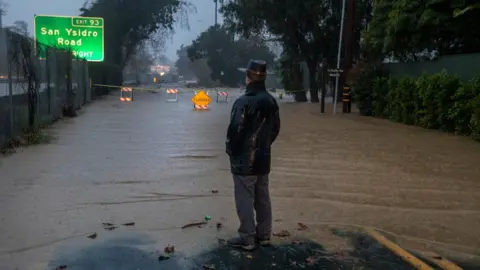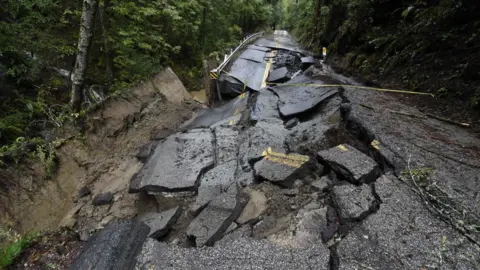Millions at risk of flooding as fierce storm lashes California
At least 14 people have died in California as a fierce storm brings torrential downpours, high winds and flooding to the state.
Thousands of people have evacuated their homes, while millions more are under severe weather warnings.
Nearly 188,000 homes and businesses were without electricity, according to data from Poweroutage.us.
Heavy rain is forecast to last much of the state throughout Tuesday, with some areas at risk of dangerous mudslides.
The National Weather Service (NWS) has described it as "the most impressive storm since January 2005".
The weather is expected to dump up to 7in (18cm) of rain in some parts by Wednesday and could produce additional flooding, mudslides and landslides. particularly in areas previously hardest hit by heavy rainfall, NWS officials warned.
"An enormous cyclone" is developing off the coast, officials said.
A five-year-old, who was swept away by floodwaters near Paso Robles on Monday, is still missing.
The boy and his mother were reportedly in a truck taking him to school when the vehicle was overcome by water. It sparked a seven-hour search that was called off when the conditions became too dangerous for divers. He has not been declared dead, local officials said, however details of when the search will resume have not been given.
Around 90% of Californians - some 34 million people in the most-populous US state - are under flood watch, according to the National Oceanic and Atmospheric Administration.
"This is not a day to be out doing anything you don't have to," Santa Barbara County Sheriff Bill Brown told the Los Angeles Times.
An order issued on Monday afternoon by the Montecito Fire Department directed residents of the town and nearby canyons: "Leave now!"
Residents unable to flee were told to move to their innermost room or high ground.
 Getty Images
Getty ImagesThe NWS reported that up to 14in (35.5cm) of rain was dumped in the last 24 hours in the region.
Across the state, average rainfall totals have hit between 400% and 600% above average values, the NWS said on Tuesday.
People living in the elite coastal enclave of Montecito were among those ordered to leave their homes.
Montecito is home to many Hollywood stars, including actor Rob Lowe, and comedian Ellen DeGeneres, who posted a video from the banks of a flooded creek on Monday.
"This is crazy!" DeGeneres said. "This creek next to our house never flows, ever. It's probably about nine feet up and is going to go another two feet up."
The evacuation comes on the fifth anniversary of a mudslide in Montecito that killed 23 people and destroyed more than 100 homes.
This new round of severe weather will bring heavy rain on already flooded rivers, damaging winds that are expected to topple trees and power lines, and heavy snow in the California mountains.
 Getty Images
Getty ImagesThe NWS forecasts the heaviest and most widespread rain to hit early Tuesday and into the afternoon. The agency issued a flood warning in areas around Los Angeles, including Orange County and the San Bernardino County Mountains.
Other evacuations have been ordered by officials, including in areas downstream of reservoirs that could overflow.
President Joe Biden declared a state of emergency for California on Monday, which allows the Federal Emergency Management Agency (Fema) to provide disaster relief.
What are atmospheric rivers and bomb cyclones?
In the last week, California has experienced two overlapping weather phenomena - an atmospheric river, where an airborne stream of dense moisture flows in from the ocean, and a bomb cyclone, a storm with a rapid drop in pressure that creates an explosive effect.
Atmospheric rivers can cause extreme rainfall and floods. Bomb cyclones require a mix of high and low temperatures, rising and dropping air pressure, and moisture, often resulting in strong winds and severe storms.
Much of the area hit by heavy rain has been under extreme drought conditions. Last year, California capped how much water residents can use in an effort to conserve its depleting supply.
Despite the rain, much of the state remains under moderate to extreme drought warnings, according to the US Drought Monitor.
Experts have said that it would take many years of rain to reverse the two-decade drought that has hit the western US.
